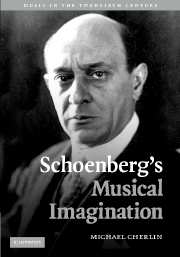Book contents
- Frontmatter
- Contents
- List of music examples and figures
- Acknowledgements
- Introduction
- 1 A passing of worlds: Gurrelieder as Schoenberg's reluctant farewell to the nineteenth century
- 2 Dialectical opposition in Schoenberg's music and thought
- 3 Dramatic conflict in Pelleas und Melisande
- 4 Motive and memory in Schoenberg's First String Quartet
- 5 Uncanny expressions of time in the music of Arnold Schoenberg
- 6 The tone row as the source of dramatic conflict in Moses und Aron
- 7 The String Trio: metaleptic Schoenberg
- Notes
- Bibliography
- General index – names and topics
- Index of Schoenberg's works and writings
Introduction
Published online by Cambridge University Press: 22 September 2009
- Frontmatter
- Contents
- List of music examples and figures
- Acknowledgements
- Introduction
- 1 A passing of worlds: Gurrelieder as Schoenberg's reluctant farewell to the nineteenth century
- 2 Dialectical opposition in Schoenberg's music and thought
- 3 Dramatic conflict in Pelleas und Melisande
- 4 Motive and memory in Schoenberg's First String Quartet
- 5 Uncanny expressions of time in the music of Arnold Schoenberg
- 6 The tone row as the source of dramatic conflict in Moses und Aron
- 7 The String Trio: metaleptic Schoenberg
- Notes
- Bibliography
- General index – names and topics
- Index of Schoenberg's works and writings
Summary
while we hunger
for a clear and beaming truth to settle our
perspectives down (a foundation upon which to
base a way of life, religion, or musical theory)
we need even more the muddled doubts of our
seeking: for to know is to be at an end …
A. R. Ammons, Glare, number 103No composer was more responsible for changes in the landscape of twentieth-century music than Arnold Schoenberg (1874–1951), and no other composer's music inspired a commensurate quantity and quality of technical description in the second half of the twentieth century. Yet the correlations between Schoenberg's musical thought and larger questions of cultural significance in and since his time have not been well addressed by musical scholarship: formalistic descriptions of music theory do not generally engage larger questions in the history of ideas, while scholars without an understanding of the formidable musical technique are ill-equipped to understand the music with any profundity of thought. To cite a case in point, the authors of Wittgenstein's Vienna claim “Schönberg, unlike Hanslick, considered the question, how a composition sounds, as having no importance.” The reader's ability to hear Schoenberg's music with any comprehension correlates directly to the perceived absurdity of that claim. I cannot imagine anything parallel being said about a major philosopher – X discovered that ideas have no importance.
- Type
- Chapter
- Information
- Schoenberg's Musical Imagination , pp. 1 - 19Publisher: Cambridge University PressPrint publication year: 2007

